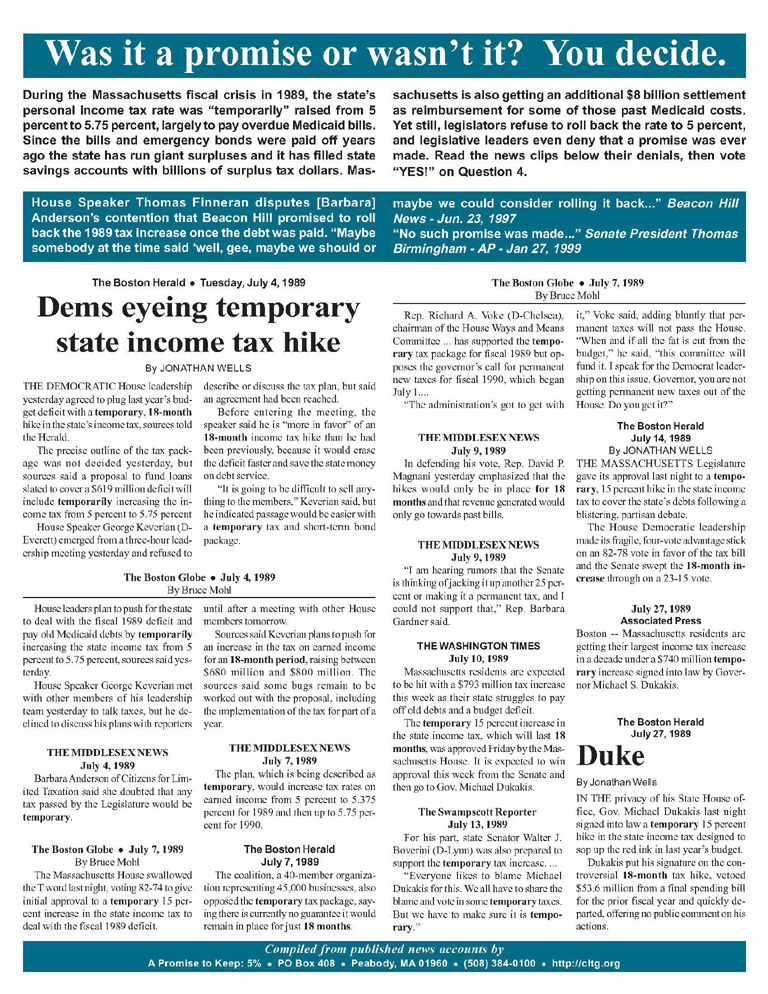Today at 1:00 p.m.
(State House Hearing Room B-1) CLT Communications Director
Chip Faulkner will appear and testify before the Joint
Committee on Revenue in opposition to H1618,
"An Act relative to income tax rates." It is sponsored
by Reps. Denise Provost (D-Somerville), Jonathan Hecht
(D-Watertown), Mary Keefe (D-Worcester), and Mike Connolly
(D-Cambridge). The sponsors hope to halt the income tax
rollback where it is, at 5.1 percent.
Chip Faulkner will deliver the following opposition
testimony to members of the committee.
Déjà vu all over again
Tuesday, June 6, 2017
To: Members of the Joint Committee on Revenue
Re: H1618, "An Act relative to income tax rates"
How many times must taxpayers shout “NO!” before those who claim to
“represent” finally hear their constituents?
Yet here we are, again, needing to remind – or introduce – some of them
of what passed before, that which they either missed or have chosen to
ignore.
In
1989, following the failed Dukakis for President campaign, he and the
Legislature recognized it had led the state into a “fiscal crisis.” The
solution of course was a massive tax hike. The only palatable way to
accomplish this was to promise it was “temporary,” for “only 18 months.”
(See attached contemporaneous news quotes, and Telegram & Gazette
editorial.)
That legislative promise went unfulfilled, unkept for a decade, until
CLT and fed up taxpayers took the matter into our own hands. We
collected the signatures and put the promised rollback on the 2000
ballot. Voters mandated — by an overwhelming vote of 59% — that the
income tax would be incrementally rolled back in three steps by 2003 to
its historic 5%.
But in 2002 legislative over-spending had driven the state into
another “fiscal crisis.” The solution to fund its $23 billion
budget (just fifteen years ago!) was to defy the voters and “freeze”
their mandate at 5.3%, and instead create an arcane formula based on
economic “triggers” that would continue the rollback – eventually.
Over the ensuing fifteen years, that formula unavoidably rolled
back the income tax rate to its current 5.1% – twenty-eight years
after the Legislature promised the income tax hike would be “temporary,”
would last “only 18 months.”
And here we are, again, with the latest scheme to deny taxpayers and
voters what was promised by the Legislature TWENTY-EIGHT YEARS AGO –
what was mandated by the voters SIXTEEN YEARS AGO.
We
wonder what part of the Legislature’s promise and the voters’ mandate
the sponsors don’t comprehend? We hope you do, and reject this affront.

Download “The Promise” PDF
here:
The
Worcester Telegram & Gazette
June 12, 2002
Editorial: Tax talk
Unlike the Massachusetts Legislature, lawmakers in most states
are addressing the post-recession revenue crunch without massive
tax hikes.
The $23.2 billion spending plan the Senate is debating this week
makes significant cuts in some areas, but its centerpiece is the
$1.2 billion increase in taxes and fees, the biggest in state
history. In a year of budget austerity, the Senate proposes a
$332 million rise in spending.
The recession has affected virtually every state. Yet all but a
handful of the 20 most populous states have avoided broad-based
tax hikes, according to the Nelson A. Rockefeller Institute,
which tracks local and state government policy. It reports that
governors and legislatures elsewhere are finding other ways to
close revenue gaps.
A case in point: California -- with a budget four times as large
as Massachusetts' and a revenue gap 10 times as large -- seeks a
comparatively modest $2 billion in tax hikes.
The Massachusetts Legislature, compounding the offense, is
nullifying two tax-relief referendums: the rollback of the
"temporary" income tax rate hike and the deduction for
charitable giving. It is counterproductive to raid taxpayers'
pocketbooks just as the economy begins to recover. Moreover,
taxes have a way of lingering in Massachusetts long after their
justification has vanished.
Quizzed by reporters, gubernatorial candidate Thomas M.
Birmingham, who as Senate president is the chief architect of
the tax package, replied deadpan that lawmakers intend to
resume the income-tax rollback and other cuts when the economy
recovers.
Bay State taxpayers, who were fooled when the Legislature
boosted the tax rate by 20 percent during the last downturn, are
justifiably skeptical.